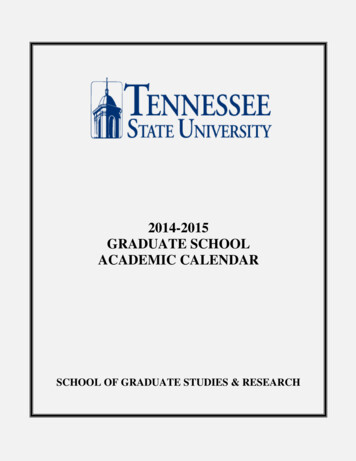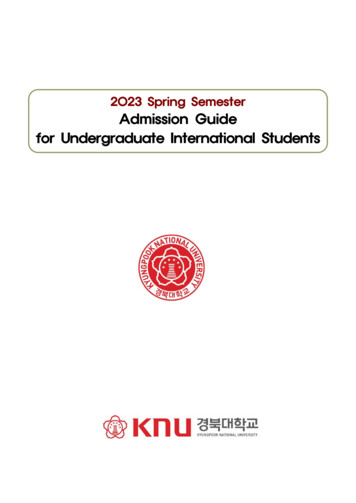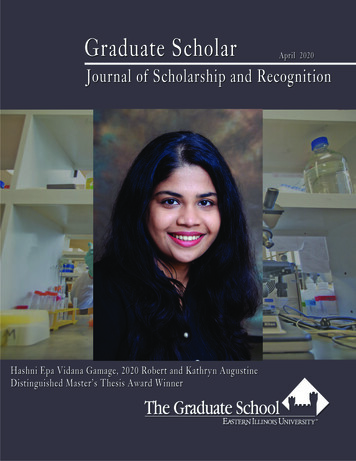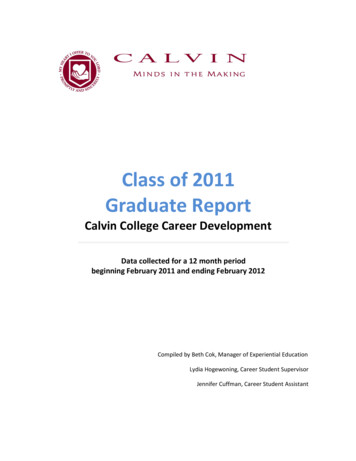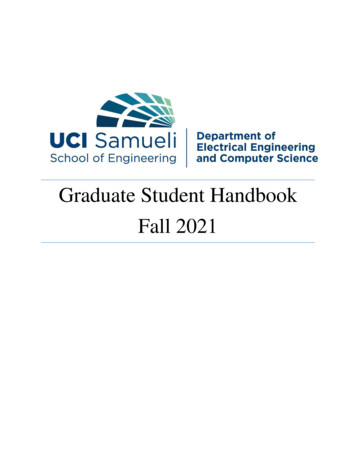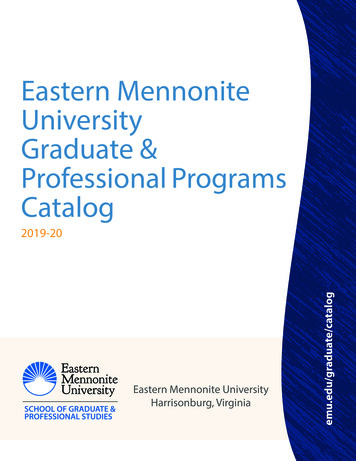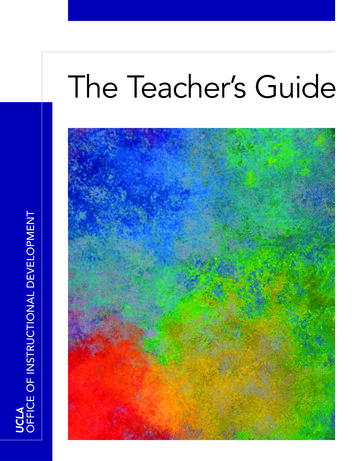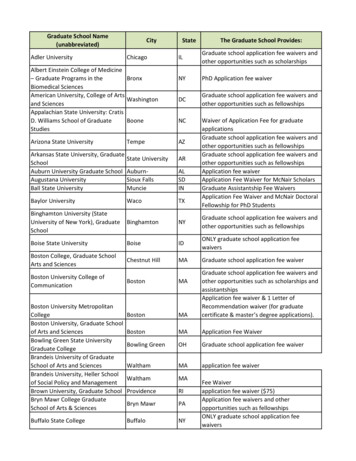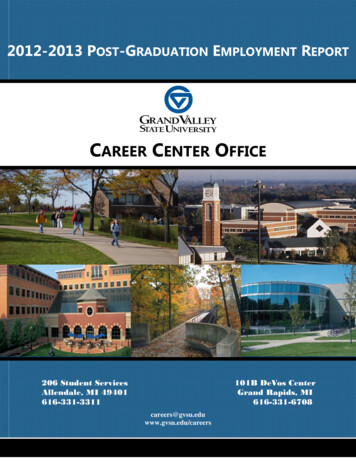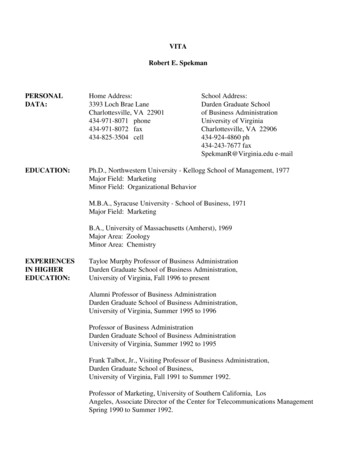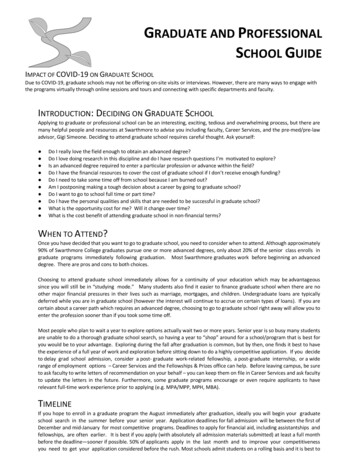
Transcription
GRADUATE AND PROFESSIONALSCHOOL GUIDEIMPACT OF COVID-19 ON GRADUATE SCHOOLDue to COVID-19, graduate schools may not be offering on-site visits or interviews. However, there are many ways to engage withthe programs virtually through online sessions and tours and connecting with specific departments and faculty.INTRODUCTION: DECIDING ON GRADUATE SCHOOLApplying to graduate or professional school can be an interesting, exciting, tedious and overwhelming process, but there aremany helpful people and resources at Swarthmore to advise you including faculty, Career Services, and the pre-med/pre-lawadvisor, Gigi Simeone. Deciding to attend graduate school requires careful thought. Ask yourself: Do I really love the field enough to obtain an advanced degree?Do I love doing research in this discipline and do I have research questions I’m motivated to explore?Is an advanced degree required to enter a particular profession or advance within the field?Do I have the financial resources to cover the cost of graduate school if I don’t receive enough funding?Do I need to take some time off from school because I am burned out?Am I postponing making a tough decision about a career by going to graduate school?Do I want to go to school full time or part time?Do I have the personal qualities and skills that are needed to be successful in graduate school?What is the opportunity cost for me? Will it change over time?What is the cost benefit of attending graduate school in non-financial terms?WHEN TO ATTEND?Once you have decided that you want to go to graduate school, you need to consider when to attend. Although approximately90% of Swarthmore College graduates pursue one or more advanced degrees, only about 20% of the senior class enrolls ingraduate programs immediately following graduation. Most Swarthmore graduates work before beginning an advanceddegree. There are pros and cons to both choices.Choosing to attend graduate school immediately allows for a continuity of your education which may be advantageoussince you will still be in “studying mode.” Many students also find it easier to finance graduate school when there are noother major financial pressures in their lives such as marriage, mortgages, and children. Undergraduate loans are typicallydeferred while you are in graduate school (however the interest will continue to accrue on certain types of loans). If you arecertain about a career path which requires an advanced degree, choosing to go to graduate school right away will allow you toenter the profession sooner than if you took some time off.Most people who plan to wait a year to explore options actually wait two or more years. Senior year is so busy many studentsare unable to do a thorough graduate school search, so having a year to “shop” around for a school/program that is best foryou would be to your advantage. Exploring during the fall after graduation is common, but by then, one finds it best to havethe experience of a full year of work and exploration before sitting down to do a highly competitive application. If you decideto delay grad school admission, consider a post- graduate work-related fellowship, a post-graduate internship, or a widerange of employment options – Career Services and the Fellowships & Prizes office can help. Before leaving campus, be sureto ask faculty to write letters of recommendation on your behalf – you can keep them on file in Career Services and ask facultyto update the letters in the future. Furthermore, some graduate programs encourage or even require applicants to haverelevant full-time work experience prior to applying (e.g. MPA/MPP, MPH, MBA).TIMELINEIf you hope to enroll in a graduate program the August immediately after graduation, ideally you will begin your graduateschool search in the summer before your senior year. Application deadlines for fall admission will be between the first ofDecember and mid-January for most competitive programs. Deadlines to apply for financial aid, including assistantships andfellowships, are often earlier. It is best if you apply (with absolutely all admission materials submitted) at least a full monthbefore the deadline—sooner if possible. 50% of applicants apply in the last month and to improve your competitivenessyou need to get your application considered before the rush. Most schools admit students on a rolling basis and it is best to
apply when all of the slots and all of the financial aid awards are still available. If you wait until the last month, you arecompeting with most of the applicant pool, but with only half of the slots still available. A detailed timeline can be found laterin this handout.RESEARCHING & EVALUATING GRADUATE PROGRAMSSearching for a graduate school is a much different process than searching for a college while in high school. Because graduateschool offers specialized training in a particular field, there are different elements to consider. Some of the criteria include: The reputation and/or rankings of the department from which you hope to earn a degreeThe curriculum and types of courses and research requiredThe faculty members in the department and their individual research interests (for PhD programs)The number of students accepted into the program and the competitivenessThe location and size of the institutionThe cost of the degree and types of funding available (grants, fellowships, assistantships)Statistics on the types of jobs and careers pursued by their graduatesYour qualifications for the particular schools to which you think you may applyThe reputation and/or rankings of the universityAt this level, departmental reputation or ranking is usually more important than overall university reputation. Graduate schoolrankings are often subjective and difficult to assess – ask Swarthmore faculty, review university affiliations of leading scholars(often found in academic journals) and ask graduate programs for detailed reports on the post-graduate plans of their alumni. ForPh.D. programs in particular, it is often interesting to consider the mean number of years it takes candidates to complete theirdegree. It is often much longer than one would initially expect.In addition, choosing the right Ph.D. program can often be like selecting an “apprenticeship” -- you choose a scholar or scholarsyou want to work with and learn from. Often these faculty members have research funding that provides for graduateassistantships – a key way of funding your graduate study!QUESTIONS TO ASK GRADUATE PROGRAMS(FROM THE CHRONICLE OF HIGHER EDUCATION)Admissions – How many applications does your program receive each year? How many students are accepted? Howmany enroll? What are the average GPA’s and GRE, LSAT, MCAT, etc scores of accepted students? Financial Aid – What kind of financial support can students expect to receive during the entire course of their program? Dostudents need to reapply for funding annually? What is the area cost of living? How much debt do graduates have, on average? Teaching (for Ph.D.’s) – How many discussion sections and courses are grad students required to teach in order to receivea stipend each year of their program? What is the average teaching load each year? Attrition – What % of students enrolled in the program receive their degrees? At what point do most drop out and why? Time to Degree – How many years does it take to graduate, on average? Career Prospects – How long are graduates on the job market? For Ph.D. programs: Where is every graduate employed inacademe and in what kinds of positions (e.g. tenure track vs. visiting instructors and adjuncts)? Who was their dissertationadvisor? What were their subfields? Where are graduates working, if not in academe? Does the program lead to other careerpaths outside academe? For Law Schools: What are the bar passage rates for students? How many students find jobs whereboth a J.D. and bar passage is required? For Med Schools: What’s your residency match rate? RESOURCESThere are many resources for researching graduate programs. Even if you think graduate school is not in your immediate future,take advantage of the resources you have. Faculty – They know many of the best programs and people within those programs. They also know a great deal about theapplication process. Research conducted with faculty while at Swarthmore and informal discussions with faculty are greatways to prepare for grad school. Career Services – We have many resources available to assist with research on graduate school and programs – a detailedlist can be found later in this handout.Websites – Graduate schools have websites with information about their programs, admission requirements andapplications available to download. You can also check out web forums where prospective and current graduate studentsdiscuss everything from deciding where to apply, to taking licensing exams and finding a job. Some of the popular ones arethegradcafe.com, top-law-schools.com, & studentdoctor.net.
Students – Talk to students currently enrolled in a particular program to gain their perspective on the school, department,faculty and general quality of life as a graduate student. Alumni of graduate programs can also be a useful resource – consultthe Online Alumni Community for contact information for Swat alumni who have gone on to receive advanced degrees.THE APPLICATION PROCESSCompleting an application for graduate school takes a great deal of time, energy and thoughtful preparation. Start early on thisprocess (a year before you plan to matriculate) to avoid last minute stress!ApplicationMost schools have their applications available on their websites; however, some will require you to apply through organizationsthat facilitate the admissions process (i.e., LSAC). You will either complete the application online or download it as a .pdf file. If theschools you are applying to have a rolling admission process, you should apply as early as possible since applications are reviewedas they are received.Letters of RecommendationYou will need to provide each graduate school with letters of recommendation from current and/or former professorsand/or employers. Typically schools require 3-4 letters. Many schools provide online forms for your recommenders to complete.Career Services also provides forms for professors writing letters of recommendation, if the graduate/professional school does notuse an online form. In choosing your recommenders, remember that above all, graduate admissions committees are evaluatingyour potential as a student. This is also true for professional schools; in trying to choose between a professor and a formeremployer or supervisor, most programs prefer letters from professors.Letters are best if they are from people who know you well and are in a position to evaluate your work, rather than from thosewho may have a higher title. Cursory letters from significant people (e.g. a letter from the Senator in whose office you interned)are often much less useful in making your case to the admissions committee than letters from people who actually know yourday-to-day work (e.g. the Legislative Assistant you actually worked for). This is especially true for law and professional schools.Ensure excellent letters of recommendation by providing your recommenders with the data they need – your resume, researchpapers, and transcripts – and be direct about asking them if they feel they know your capabilities well enough to write a strongletter on your behalf. Give recommenders time to write effective letters – at least two weeks notice – and a deadline for submittingthe letter – usually 1-2 weeks before you need the letter, to allow for any possible delay.Personal StatementsMost graduate school applications require a personal statement or essay, which is an integral part of the application andcriteria for selection. When all is said and done, your personal statement is about the only part of your application that you canpositively affect at the time you are applying (your courses, GPA, test scores and even your recommenders’ opinions are prettywell set). It is the part of the application that will make the difference when there are more than enough qualified applicants.Take the time to do it well. Ask several people to read it and comment – faculty, career counselors and peer advisors. When writingyour statement, focus on why you are applying to this specific program and why they should admit you. Graduate programs aren’tseeking “cookie cutter” candidates – they are looking for unique skills, qualities and experiences you will bring to the program.When writing your statement remember that admissions representatives read hundreds of essays. Be concise, clear, andcompelling. Demonstrate that you’ve carefully considered graduate study and how it will help you accomplish your long-term goals.This Essay Writing website can be helpful: ion Test ScoresDue to COVID-19, many programs waived this requirement. Whether you are applying to law school, dental school, medicalschool, business school or a general graduate program, most programs require you to take the appropriate graduate schooladmission test. There are a few graduate programs that no longer require the GRE subject test or even the general GRE; however,be sure you know for certain what your prospective schools require. Below is a list of links to the most common tests used inthe graduate school admission process: GraduateRecord Examinations (GRE) http://www.ets.org/gre/The general test is most often required by programs and is computer-based, offered year-round.GRE subject tests may be required by the programs you apply to and are offered as paper-based tests only threetimes ayear: September; October; and April. Subject tests are available in the following disciplines: Biochemistry, Cell &Molecular Biology; Biology; Chemistry; Literature in English; Mathematics; Physics; Psychology. One test may betaken per administration day.
Graduate Management Admissions Test (GMAT) for business school http://www.mba.com/the-gmatMedical College Admissions Test (MCAT) https://www.aamc.org/students/applying/mcat/Law School Admissions Test (LSAT) al Admission Test (DAT) http://www.ada.org/dat.aspxMiller Analogies Test (MAT) http://www.milleranalogies.comThe following sites offer test prep info, including free downloads of sample tests: Peterson’s .aspx Kaplan http://www.kaptest.com/ The Princeton Review http://www.princetonreview.com/Test Prep Pro Tips If taking the GRE, make sure to download ETS’s PowerPrep software after you register, which includes 2 freepractice exams. These practice exams simulate the experience of taking the actual test. Also, check out CareerServices for the official GRE guidebook. If you’re looking for an affordable but still high-quality test prep resource, try Magoosh (https://magoosh.com/) Try to give yourself at least 2 months to study for whatever test you takeOfficial TranscriptsYou will need to provide each graduate school with an official transcript. You may obtain them from the College Registrar’s office.Visit the Registrar’s website at http://registrar.swarthmore.edu. One hint is to order several transcripts at once to be sure youhave them on hand when you need them. Each one will be in a separate sealed “official” envelope. If you keep it sealed, it can beused later in the application process.Resume or Curriculum VitaeYou may be asked to provide a resume or curriculum vitae with your application to graduate or professional school. You may obtaina copy of the Resume, CV and Cover Letter Guide from Career Services and have yur document reviewed by a career counselor orCareer Peer Advisor. Including a resume/cv in your application package – even when not specifically requested – can be a greatway to share additional information about your experience and research interests.InterviewsA personal interview is a valuable tool for you as the applicant and for the graduate school admission committee. Graduate schoolinterviews are not always required for admission. Many large research institutions do not offer personal interviews because ofthe volume of applicants. Be sure to find out if your program factors an interview into their decision making process and preparewell in advance of the interview.The interviewer's main focus in assessing your academic background is to determine whether you are up for the challenge of anadvanced degree. In addition to assessing your academic background, interviewers will be interested in learning more about yourpersonal qualities, future goals, motivation, and support network.In addition to the interview providing the opportunity for you to share relevant information about yourself, it is also a time for youto gather more information about the program. You may be able to talk with faculty members with whom you would particularlylike to study. Use this as an opportunity to get a sense of what it could be like to work with them (e.g., What are your publicationexpectations for your advisees?).This is also a perfect time to receive clarification on any info you’re curious about but are unableto find on the department/school’s website (e.g., summer funding).If you do plan to have a personal admission interview, review Interviewing Guide on the career services websiteand/or schedule a virtual mock interview with a career counselor.FINANCIAL ASSISTANCEThere are many types of funding you can obtain for graduate and professional school programs. Most graduate students seekfunding in the form of assistantships and fellowships from their academic departments, but this funding is typically moreavailable to Ph.D. students than Master’s students and rarely available to professional students (law, medicine and health sciences,business). The FAFSA (Free Application for Federal Student Aid) is typically required and can be found at: http://www.fafsa.ed.gov/For a good overview of funding, visit the following websites:
aduate-professional-funding-info.pdf Grants and Scholarships – Financial assistance that does not need to be paid back and does not require work inexchange. Assistantships – Usually research or teaching assistantships are available in most academic departments – these typicallyinclude a tuition waiver and work stipend. Assistantships are also offered in non- academic areas as well including residencelife, student activities, career services, etc. Public or Private Fellowships – Typically these are not associated with your program. An example would be a corporatesponsored fellowship or the Swarthmore Fellowships for graduates attending graduate school. Federal Perkins Loan – low interest (5%) loan available to students with exceptional financial need, awarded throughyour school’s financial aid office and repaid to your school. You can borrow up to 8,000 per year for a total of 60,000,including amounts borrowed as an undergraduate: https://studentaid.ed.gov/sa/types/loans/perkins Graduate Stafford Loans (Direct Loans) – Stafford loans are low interest rate federal loans available to most studentsand repaid after you graduate. Unsubsidized Direct Loans are available with a 6% interest rate. For more information, speakwith the financial aid office at the schools where you are applying or sidized-unsubsidized Graduate Direct PLUS Loans – low, fixed interest rate (7%) student loan guaranteed by the U.S. Government. There is alsoa loan origination fee, which is deducted from each disbursement (around 4%). The Grad PLUS loan is a non-need credit basedloan similar to a private student loan with the benefit of having a fixed interest rate and federal /plus In-State Tuition – Sometimes an out-of-state applicant will be given in-state tuition as a grant. This is often worth severalthousand dollars. Federal Work Study – Part-time jobs for students with financial need:https://studentaid.ed.gov/sa/types/work-study *Income Driven Repayment Plans & Public Service Loan Forgiveness - For students who will need to take on alarge amount of student loan debt in order to finance graduate school, the federal government has provided a means throughwhich you will be able to have your debt forgiven after a period of time in the form of income driven repayment plans.Individuals typically apply for these plans when their outstanding federal student loan debt is higher than their annual incomeor if it represents a significant portion of their annual income. Income-driven repayment plans are designed to make yourstudent loan debt more manageable by reducing your monthly payment amount. Additionally, if you make consistentpayments under one of these plans for a period of time (usually 20-25 years), you’ll have your remaining balance of debtforgiven. d/plans/income-drivenFor students interested in public service work (e.g., federal/state government, non-profit, teaching, etc.) you may qualify forthe Public Service Loan Forgiveness program. This program is similar to the typical income driven plans; however, instead offollowing the 20-25 year plan, your debt will be forgiven in 10 years. sscancellation/public-serviceHow to Pay for Your Graduate Education (adapted with permission)By Donald Asher, author of Graduate Admissions Essays, the best-selling guide to the graduate application process.You’d love to go to graduate school, if only you could find a way to pay for it, right? Well, maybe you’re thinking about it backwards.Maybe you have to decide to go first, and then you’ll find the money. For many types of grad schools, you’ll have to apply to theprogram, simultaneously apply for several internal and external sources of funding, and wait for months to see how it’s going towork for you. So step one is clearly to decide to go. Looking for money is just a part of the process.
Next, stop looking for “financial aid.” That’s an undergraduate term. You want to look for “funding” and “support.” The bestsource for funding is the graduate department and financial aid office where you plan to apply. Remember that sometimes auniversity financial aid office must be involved for university-wide, federal or state aid, while the individual department will awardgrants and assistantships. Be sure you have done everything you need to do to apply for both.Financial assistance for Ph.D. programs is primarily merit based and most often comes in the form of grants and assistantships.Financial aid for most MA/MS programs and professional degrees is primarily loan based. If you are not sure what level of degreeyou will be seeking, it is often better financially to seek the Ph.D. right from the beginning rather than to figure on exploring withthe Master’s degree and then making the jump to the Ph.D.Let’s start with merit scholarships. If you’re brilliant, with the fantastic grades and scores to prove it, many graduate programs,including law and business, will give you a merit scholarship or a full waiver of tuition. Here’s the secret: Tier 2 schools poach talentfrom Tier 1 schools by offering a free ride. So you get into Top Ten School of Law and the Pretty Good School of Law, but Top Tenwants you to pay full fare while Pretty Good gives you a free ride. All kinds of programs do this, but many don’t talk about it.Also, think about taking the plunge and going for the doctorate. Full-time doctoral students at many—but certainly not all—programs automatically get a full waiver of tuition. This is well known among academicians, but not well known by the generalpublic.Next, look for assistantships. Assistantships are a weird animal. According to the IRS, they are jobs. According to most faculty, theyare apprenticeship programs. According to some students, they are a form of modern indentured servitude. They are alsoan honor and a form of financial aid. The good news is that assistantships almost always include a full waiver of tuition plus astipend. Stipends vary from as little as 8,000 a year to more than 30,000 per year, but the real value of an assistantship is thewaiver of tuition. For ten to twenty hours a week of service to your department, you can go to school for free.Obviously, if you are not paying tuition, public and private schools cost the same, and in-state and out-of-state tuition is also exactlythe same. Because of this, it is frequently cheaper to go to an expensive school! They often have more money to give to studentsthey want to recruit.There are three types of assistantships. Most undergraduates know about Teaching assistantships. To get a teachingassistantship, you have to have outstanding grades in the subject, maybe a strong GRE score, and maybe prior teaching or tutoringexperience. Departments have stringent rules about who gets selected to be a teaching assistant.Research assistantships are much easier to get than teaching assistantships. You don’t have to have great grades and scores;you just have to have the same passion as a faculty member who needs an assistant. Prior research experience is more importantthan your grades or scores. All you have to do is convince one faculty member, not a whole department, that you’d be useful tohave around. Start by saying, “Dr. Lee, I’ve read every article you’ve ever written. I think you’re a genius .” Well, maybe not literally,but you get the idea. There are research assistantships all over any campus, including in areas where students might not think tolook, for example, in English and education departments.Graduate assistantships are the easiest to get, in terms of what credentials you need to possess. GA assignments are reallyjust jobs, with less of an academic component. There may be assistantships available from other university departments,often within student affairs: residence life; student activities; career services and others. For example, undergraduate residentiallife offices frequently hire graduate students as head residents-regardless of department. Coming from a small residential liberalarts college is frequently to your advantage, especially if you have been an RA or otherwise been active in student life.Here’s a secret assistantship often overlooked: If you are a native speaker of a foreign language, you can sometimes geta teaching assistantship in a foreign language department, leading a conversation group or even a whole class, while you arestudying somewhere else, say engineering or business. If you speak a truly needed language, such as Arabic, you may find thisan easy way to pay for your graduate education. Sometimes there are opportunities to be an instructor in areas where there areshortages, for example, an acquaintance of mine paid for his doctoral studies by teaching statistics in several departments.One of the few ways to go to business and law school for free is by being a graduate assistant. They take GAs in only a few selectareas, typically career services, admissions, and IT roles. Interest alone won’t win these assignments; some kind of priorexperience is usually required.If you want to get assistantships it helps to be a doctoral student, but all these assistantships are available for you as a master’sdegree student at all universities that do not offer the doctoral degree in your field of choice. Assistantships are common for fulltime students at brick-and-mortar institutions, and pretty rare at online and distributed-model institutions and for all part-timestudents.
If you want to go to school for free part-time, one of the better ways is through some type of employer-sponsored educationalbenefits program. Many universities themselves have outstanding educational benefits for full-time employees, so making acareer move to working for a university may be your best way to get additional degrees and credentials part-time without takingout any loans. Of course, other types of employers subsidize the educations of their employees. Watch out for complicated rules!For example, some employers only reimburse you for completed courses, or for courses directly related to your ongoingassignments, some cover books and fees and others only tuition, and you may have to pay back every dime if you subsequentlyleave the company within a specified time of using these benefits.Suppose you have to pay for your own education. Wouldn’t it be nice to have a scholarship for 25 to 30% or more of your tuition?You can! If you’ll study something that helps you advance in the career you already have, your tuition is tax deductible. So thegovernment in effect gives you a scholarship equal to your combined federal and state income tax rate. Be careful, though. If anauditor decides your investment in a part-time master’s degree in poetry has no bearing on your career in corporate finance, it’snot deductible at all. Consult a tax professional before trying to deduct any educational expenses.Many people pay for their graduate educations through loans. If you stand to earn significantly more money upon completing adegree or credential program, it makes sense to borrow money and pay it back later through increased income. In fact,education is one of the best investments you’ll ever make, according to the Bureau of Labor Statistics. People who complete amaster’s degree will earn 400,000 more than people who stop at the bachelor’s degree. A Ph.D. is worth 1.3 million more,and doctors and lawyers earn 2.3 million more. Individual results will vary, but on average, borrowing money for tuition canmake sense.In the sciences it’s expected that you will apply for three or four third-party funding sources and, frankly, that’s a
Searching for a graduate school is a much different process than searching for a college while in high school. Because graduate school offers specialized training in a particular field, there are different elements to consider. Some of the criteria include: The reputation and/or rankings of the department from which you hope to earn a degree
